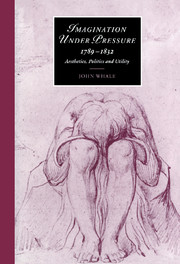Book contents
- Frontmatter
- Contents
- Acknowledgements
- Introduction
- Part I IMAGINATION AND REVOLUTION
- Chapter 1 Burke and the civic imagination
- Chapter 2 Paine's attack on artifice
- Chapter 3 Wollstonecraft, imagination, and futurity
- Part II IMAGINATION AND UTILITY
- Afterword
- Notes
- Bibliography
- Index
- CAMBRIDGE STUDIES IN ROMANTICISM
Chapter 3 - Wollstonecraft, imagination, and futurity
Published online by Cambridge University Press: 22 September 2009
- Frontmatter
- Contents
- Acknowledgements
- Introduction
- Part I IMAGINATION AND REVOLUTION
- Chapter 1 Burke and the civic imagination
- Chapter 2 Paine's attack on artifice
- Chapter 3 Wollstonecraft, imagination, and futurity
- Part II IMAGINATION AND UTILITY
- Afterword
- Notes
- Bibliography
- Index
- CAMBRIDGE STUDIES IN ROMANTICISM
Summary
Wollstonecraft's response to revolution consists of a radical attempt to redefine subjectivity in line with a perfectibilist optimism in the progress of history. Her writing engages in a thorough-going reconstruction of the psychic economy of the individual which renegotiates the relationship between enlightened reason and refined sensibility. Within its proclaimed rationalism it re-imagines the value of emotions. Imagination lies at the heart of this ambitious project and is subject to all the consequent pressures as Wollstonecraft attempts to articulate this new relationship between heart and head for both men and women. And, as we shall see, the cultural reverberations of this economy are far-reaching. Wollstonecraft's work raises the question as to whether aesthetic issues are important at all in the larger context of historical improvement and an increasingly technical political economy.
Imagination, for Wollstonecraft, functions as an agent of moral improvement. It supports the present moment of revolutionary critique with the reassuring speculative capacity of seeing into the future, of sustaining an act of faith that the project to reform the present really is part of a larger moral, even metaphysical, narrative of improvement. For Wollstonecraft, imagination plays a key role in keeping hope alive. It sustains her optimism in the narrative of the moral and civilising progress of history and it acts as a bolster to individuals like herself, who are engaged in a dominantly self-abnegating process of social change.
- Type
- Chapter
- Information
- Imagination under Pressure, 1789–1832Aesthetics, Politics and Utility, pp. 68 - 97Publisher: Cambridge University PressPrint publication year: 2000



